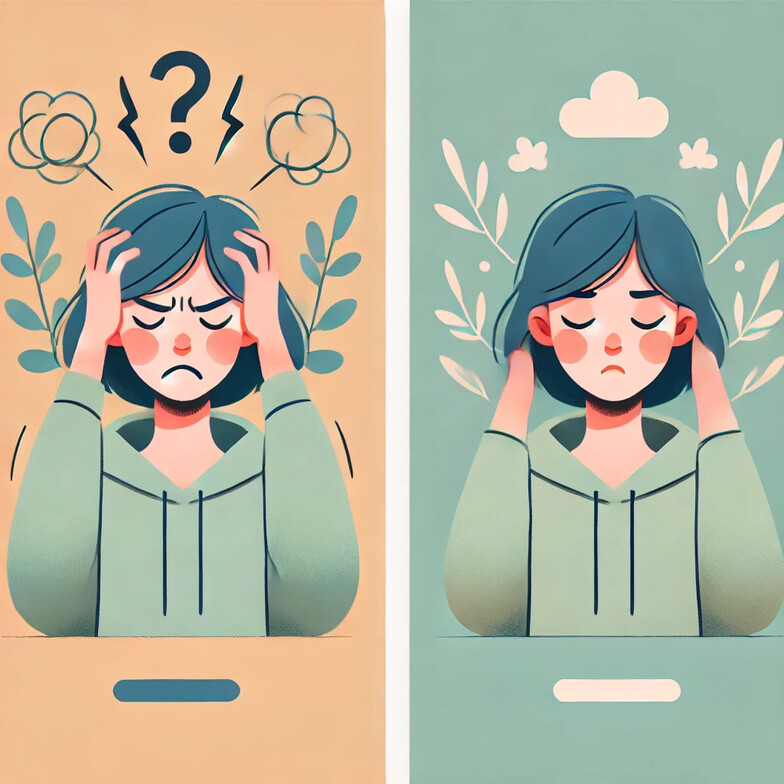
The Paradox of Perfection: How Overthinking and Stress Can Disrupt Your Health According to TCM
Focusing on your health and making the right lifestyle changes is not just important—it’s essential for healing. These positive changes, when implemented thoughtfully, can lead to the health improvements you're aiming for. Ideally, this process should follow the "set it and forget it" philosophy: you create the necessary changes, commit to them, and then allow these practices to work in the background, gradually fostering the health outcomes you desire. This approach is both practical and effective for long-term health and healing.
However, what I often see in the clinic—and honestly, something I've struggled with myself over the years—is when people become overly focused, even obsessed, with their lifestyle choices. They start to ruminate, constantly fearing they might be missing something or feeling that they’re not doing enough and could always do better. This kind of thinking can actually counteract the benefits of the healthy changes you've made.
You likely understand on an intuitive level that every emotion carries its own unique energy, and our bodies take on specific characteristics in response to that energy. For example, imagine you’re having a great time with your friends—you’re relaxed, your body feels free, and your posture is open and inviting. In contrast, when you're consumed by worry, your body posture becomes closed off and tense. If you pay attention, you'll notice that your muscular system feels locked down and tight. Your heart rate might be higher, and the way you interact with loved ones might shift, becoming more reserved or strained.
Getting to know yourself in each of these energetic states is a powerful tool for improving not just your mental health, but your physical health as well. Being mindful of your body, your nervous system, and how you feel physically in different emotional states is the first step toward mastering your emotions. Truly embodying these emotions and the corresponding physical states can be a game-changer for your overall well-being.
Let’s explore how Traditional Chinese Medicine (TCM) understands these emotions, the organ systems they affect, and the signs and symptoms that indicate when an organ group is under stress.
Organ Emotions in Traditional Chinese Medicine
In Traditional Chinese Medicine (TCM), each organ is associated with specific emotions, and an imbalance in these emotions can lead to physical and emotional disharmony. It’s important to note that when we refer to organs such as the Spleen in TCM, we are often discussing their broader functional roles, such as the Spleen's responsibility for digestion, rather than just the anatomical organ.
The Spleen and Overthinking
The Spleen is the organ most closely associated with the emotion of overthinking and worry in TCM. When the Spleen is out of balance, it can lead to excessive rumination, obsessive thoughts, and a constant state of mental activity. This overactivity of the mind can deplete the Spleen's energy, leading to symptoms such as:
- Digestive issues (e.g., bloating, poor appetite)
- Fatigue and a sense of heaviness
- Insomnia, particularly difficulty falling asleep due to an overactive mind
- Poor concentration and memory
In your case, the constant focus on health and doing things "right" is likely overburdening the Spleen, leading to the mental restlessness and sleep disturbances you're experiencing.
The Heart and Stress
The Heart in TCM is associated with the emotion of joy but also with mental activity and the spirit, known as the Shen. There is a saying in TCM that "the Heart houses the mind," and the mind is responsible for our thoughts. When our thoughts are not stable, we often look to the Heart. When the Heart is balanced, we experience a sense of calm, contentment, and clear thinking. However, chronic stress, especially stress that revolves around mental activity and overthinking, can disturb the Heart and the Shen, leading to:
- Insomnia, particularly waking up frequently or having trouble falling back asleep
- Palpitations or a sense of unease
- Anxiety and restlessness
- Disturbed or vivid dreams
The state of hyper-focus and the stress it generates may be disrupting your Heart energy, leading to sleep disturbances and emotional instability.
The Liver and Emotional Regulation
The Liver in TCM is responsible for the smooth flow of Qi (energy) throughout the body and is closely linked with the emotion of anger. While anger is the primary emotion, frustration, irritability, and stress also affect the Liver. When the Liver is out of balance, Qi becomes stagnant, leading to symptoms such as:
- Tension, especially in the neck and shoulders
- Headaches, particularly tension headaches or migraines
- Irritability and frustration
- Insomnia, often waking up between 1-3 AM, which is the Liver's time according to the TCM body clock
Chronic stress and overthinking can easily lead to Liver Qi stagnation, further contributing to the cycle of stress and poor sleep.
Balancing Emotions and Organ Health
To address these issues from a TCM perspective, it is essential to work on balancing the emotions associated with the affected organs:
Spleen Support:
- Engage in grounding activities like mindfulness meditation or tai chi to help calm the mind.
- Focus on a balanced diet with warm, nourishing foods that support the Spleen, such as root vegetables, cooked grains, and soups.
- Practice mental hygiene by setting boundaries on how much time you spend thinking or researching about health, allowing your mind to rest.
Heart Nourishment:
- Develop a bedtime routine that calms the Shen, such as reading something light or listening to calming music before sleep.
- Incorporate herbs like Suan Zao Ren (Ziziphus) or Bai Zi Ren (Biota seed) that nourish the Heart and calm the mind (consult with a TCM practitioner before starting any herbal regimen).
- Engage in joyful activities that help you relax and bring a sense of contentment.
Liver Qi Regulation:
- Incorporate regular physical activity that promotes the free flow of Qi, such as walking, yoga, or acupuncture.
- Practice emotional release techniques, such as journaling or talking to a trusted friend, to help move stagnant Liver Qi.
- Avoid stimulants like caffeine and alcohol, which can exacerbate Liver Qi stagnation.
The Role of Acupuncture in Resetting the Nervous System
An acupuncture appointment can be extremely beneficial in helping to reset your body from a sympathetic (fight or flight) to a parasympathetic (rest and digest) state. Acupuncture works by stimulating specific points on the body, which can help regulate the nervous system, reduce stress, and promote relaxation. When your body is constantly in a state of stress, it remains locked in a sympathetic response, which can lead to many of the physical and emotional symptoms discussed earlier.
Acupuncture helps to "reset" the nervous system by activating the parasympathetic response, allowing your body to enter a state of deep relaxation and healing. This shift not only helps to reduce immediate symptoms of stress and anxiety but also supports long-term health by improving sleep, digestion, and overall energy levels. By regularly engaging in acupuncture and other TCM practices, you can help maintain a balanced nervous system, which is key to both mental and physical well-being.
Conclusion
Understanding the relationship between your emotions and organ health can provide valuable insights into why you might be experiencing certain physical symptoms. By addressing the root cause of your overthinking, stress, and sleep disturbances through the lens of TCM, you can begin to restore balance to your body and mind. Working with a qualified TCM practitioner can help tailor a treatment plan that includes acupuncture, herbal medicine, and lifestyle adjustments to support your overall well-being.
In summary, while it's important to take care of your health, it's equally important to ensure that the process doesn't become a source of stress. Incorporating joy and fun into your daily life is a powerful way to support your overall well-being, helping to regulate your nervous system and promote a healthy balance between the mind and body. And remember, acupuncture can be an essential tool in resetting your body and mind, helping you shift from a state of stress to one of healing and balance.

Tanya Kelloway
Contact Me




